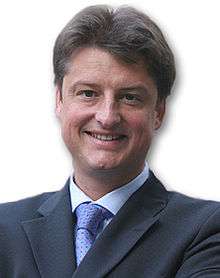2019 European Parliament election in Belgium
The European Parliament election of 2019 in Belgium was held on 26 May 2019 in the three Belgian constituencies: the Dutch-speaking electoral college, the French-speaking electoral college and the German-speaking electoral college.
| |||||||||||||||||||||||||||||||||||||||||||||||||||||||||||||||||||||||||||||||||||||||||||||||||||||||||||||||||||||||||||||||||
All 21 Belgian seats to the European Parliament | |||||||||||||||||||||||||||||||||||||||||||||||||||||||||||||||||||||||||||||||||||||||||||||||||||||||||||||||||||||||||||||||||
|---|---|---|---|---|---|---|---|---|---|---|---|---|---|---|---|---|---|---|---|---|---|---|---|---|---|---|---|---|---|---|---|---|---|---|---|---|---|---|---|---|---|---|---|---|---|---|---|---|---|---|---|---|---|---|---|---|---|---|---|---|---|---|---|---|---|---|---|---|---|---|---|---|---|---|---|---|---|---|---|---|---|---|---|---|---|---|---|---|---|---|---|---|---|---|---|---|---|---|---|---|---|---|---|---|---|---|---|---|---|---|---|---|---|---|---|---|---|---|---|---|---|---|---|---|---|---|---|---|---|
| Turnout | 88.47% | ||||||||||||||||||||||||||||||||||||||||||||||||||||||||||||||||||||||||||||||||||||||||||||||||||||||||||||||||||||||||||||||||
| |||||||||||||||||||||||||||||||||||||||||||||||||||||||||||||||||||||||||||||||||||||||||||||||||||||||||||||||||||||||||||||||||
_(Belgium).svg.png) | |||||||||||||||||||||||||||||||||||||||||||||||||||||||||||||||||||||||||||||||||||||||||||||||||||||||||||||||||||||||||||||||||
A royal order of 15 June 2018 fixed the date of the European Parliament election in Belgium, following an agreement at European level.[1] Per the Belgian Constitution, the Belgian regional elections, and additionally the Belgian federal election because no snap election occurred, were automatically held on the same day.
Marianne Thyssen, who was re-elected Member of the European Parliament in 2014 as lijsttrekker for CD&V and who subsequently became European Commissioner, announced in July 2018 that she would quit politics in 2019.[2]
Electoral system
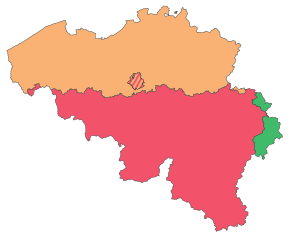
As the reapportionment after Brexit did not impact the number of seats allocated to Belgium, 21 MEPs were elected in Belgium, as in the 2014 election. One of them is by law allocated to the German-speaking electoral college and the remaining ones are allocated to the Dutch-speaking and to the French-speaking electoral college in accordance with a population formula, giving them respectively twelve and eight seats, as in 2014.[3]
Voters could only vote on the lists depending on the language area they live in. This means that in the bilingual arrondissement of Brussels-Capital, voters could choose whether to vote for the Dutch-speaking or for the French-speaking electoral college. There was an exception to this rule for the six municipalities with language facilities in the Brussels Periphery, whose inhabitants could also opt to vote for French-speaking lists despite being in the Dutch language area.
Seats were allocated according to the D'Hondt method in each of the three electoral colleges; however, the German-speaking electoral college de facto used a first-past-the-post system, since it elected only one MEP. The electoral threshold was 5%, which was based on the vote share per electoral college rather than nationally.
All Belgian citizens aged 18 or over and residing in Belgium were obligated to participate in the election.
Other EU citizens residing in Belgium as well as Belgians living in another EU member state had the right to vote on Belgian lists in European Parliament elections. The law of 17 November 2016 extended this right to Belgians living in a non-EU member state, which was already possible for federal elections.
Results
| |||||||||||
| Party | European party | Main candidate | Electoral college | Votes | % | +/– | E.c. % | Seats | +/– | ||
|---|---|---|---|---|---|---|---|---|---|---|---|
| New Flemish Alliance (N-VA) | ECR | Geert Bourgeois | Dutch-speaking | 954,048 | 14.17 | 2.62 |
22.44 | 3 / 21 |
1 | ||
| Flemish Interest (VB) | EAPN | Gerolf Annemans | Dutch-speaking | 811,169 | 12.05 | 7.79 |
19.08 | 3 / 21 |
2 | ||
| Open Flemish Liberals and Democrats (Open VLD) | ALDE | Guy Verhofstadt | Dutch-speaking | 678,051 | 10.07 | 2.77 |
15.95 | 2 / 21 |
1 | ||
| Socialist Party (PS-SP) |
PES |
Paul Magnette Matthias Zimmermann |
French-speaking German-speaking |
655,812 651,157 4,655 |
9.74 9.67 0.07 |
1.03 1.01 0.02 |
26.69 11.42 |
2 / 21 |
1 1 0 | ||
| Christian Democratic & Flemish (CD&V) | EPP | Kris Peeters | Dutch-speaking | 617,651 | 9.17 | 3.39 |
14.53 | 2 / 21 |
0 | ||
| Workers' Party of Belgium (PVDA-PTB) |
GUE/NGL |
Marc Botenga Line De Witte |
French-speaking Dutch-speaking |
566,274 355,883 210,391 |
8.42 5.29 3.13 |
4.91 3.29 1.62 |
14.59 4.95 |
1 / 21 |
1 1 0 | ||
| Green (Groen) | EGP | Petra De Sutter | Dutch-speaking | 525,908 | 7.81 | 1.13 |
12.37 | 1 / 21 |
0 | ||
| Ecolo |
EGP |
Philippe Lamberts Shqiprim Thaqi |
French-speaking German-speaking |
492,330 485,655 6,675 |
7.31 7.21 0.10 |
2.95 2.95 0.00 |
19.91 16.37 |
2 / 21 |
1 1 0 | ||
| Reformist Movement (MR) Party for Freedom and Progress (PFF) |
ELDR |
Olivier Chastel Yves Derwahl |
French-speaking German-speaking |
475,338 470,654 4,684 |
7.06 6.99 0.07 |
2.92 2.90 0.02 |
19.29 11.49 |
2 / 21 |
1 1 0 | ||
| Socialist Party Differently (sp.a) | PES | Kathleen Van Brempt | Dutch-speaking | 434,002 | 6.45 | 1.85 |
10.21 | 1 / 21 |
0 | ||
| Humanist Democratic Centre (cdH) | EPP | Claude Rolin | French-speaking | 218,078 | 3.24 | 0.90 |
8.94 | 1 / 21 |
0 | ||
| Christian Social Party (CSP) | EPP | Pascal Arimont | German-speaking | 14,247 | 0.21 | 0.03 |
34.94 | 1 / 21 |
0 | ||
| Democratic, Federalist, Independent (DéFI) | None | Benoît Cassart | French-speaking | 144,555 | 2.15 | 0.91 |
5.92 | 0 / 21 |
0 | ||
| People's Party (PP) | Movement | Yasmine Dehaene | French-speaking | 113,793 | 1.69 | 0.49 |
4.66 | 0 / 21 |
0 | ||
| Volt Europa (Volt) | None | Christophe Calis | Dutch-speaking | 20,385 | 0.30 | New | 0.48 | 0 / 21 |
0 | ||
| Pro German Speaking Community (ProDG) | None | Lydia Klinkenberg | German-speaking | 5,360 | 0.08 | 0.00 |
13.14 | 0 / 21 |
0 | ||
| Vivant | None | Alain Mertes | German-speaking | 4,550 | 0.07 | 0.02 |
11.16 | 0 / 21 |
0 | ||
| DierAnimal | APEU | Reiner Barczinski | German-speaking | 606 | 0.01 | New | 1.49 | 0 / 21 |
0 | ||
| Valid votes | 6,732,157 | 93.68 | |||||||||
| Blank and invalid votes | 454,520 | 6.32 | |||||||||
| Totals | 7,186,677 | 100.00 | — | — | 21 | 0 | |||||
| Electorate (eligible voters) and voter turnout | 8,122,985 | 88.47 | |||||||||
| Source: Federal Public Services Home Affairs | |||||||||||
Elected members
| Party | Elected members | |
|---|---|---|
| Dutch-speaking electoral college (12) | ||
| New Flemish Alliance (3) | Geert Bourgeois, Assita Kanko, Johan Van Overtveldt | |
| Vlaams Belang (3) | Gerolf Annemans, Filip De Man, Tom Vandendriessche[4] | |
| Open Flemish Liberals and Democrats (2) | Guy Verhofstadt, Hilde Vautmans | |
| Christian Democratic & Flemish (2) | Kris Peeters, Cindy Franssen | |
| Groen (1) | Petra De Sutter | |
| Socialist Party Differently (1) | Kathleen Van Brempt | |
| French-speaking electoral college (8) | ||
| Socialist Party (2) | Marie Arena, Marc Tarabella[5] | |
| Ecolo (2) | Philippe Lamberts, Saskia Bricmont | |
| Reformist Movement (2) | Olivier Chastel, Frédérique Ries | |
| Workers' Party of Belgium (1) | Marc Botenga | |
| Humanist Democratic Centre (1) | Benoît Lutgen | |
| German-speaking electoral college (1) | ||
| Christian Social Party (1) | Pascal Arimont | |
Groups
From 2019 European Parliament election#Groups
| Alliance | Seats | |
|---|---|---|
| European People's Party (EPP) | 4 | |
| Renew Europe (RE) | 4 | |
| Progressive Alliance of Socialists and Democrats (S&D) | 3 | |
| Identity and Democracy (ID) | 3 | |
| European Conservatives and Reformists (ECR) | 3 | |
| Greens–European Free Alliance (Greens/EFA) | 3 | |
| European United Left–Nordic Green Left (GUE/NGL) | 1 | |
| Non-Inscrits | 0 | |
Outgoing delegation
| Group | 21 | Dutch-speaking electoral college | 12 | French-speaking electoral college | 8 | German-speaking electoral college | 1 | ||||
|---|---|---|---|---|---|---|---|---|---|---|---|
| ALDE | 6 | Open Flemish Liberals and Democrats (Open VLD) | 3 | Reformist Movement (MR) | 3 | ||||||
| ECR | 4 | New Flemish Alliance (N-VA) | 4 | ||||||||
| S&D | 4 | Socialist Party Differently (sp.a) | 1 | Socialist Party (PS) | 3 | ||||||
| EPP | 4 | Christian Democratic & Flemish (CD&V) | 2 | Humanist Democratic Centre (cdH) | 1 | Christian Social Party (CSP) | 1 | ||||
| Greens-EFA | 2 | Groen | 1 | Ecolo | 1 | ||||||
| ENF | 1 | Vlaams Belang (VB) | 1 | ||||||||
External links
References
- 15 juni 2018. - Koninklijk besluit tot vastlegging van de datum van de verkiezing van het Europese Parlement
- "Marianne Thyssen stapt volgend jaar uit de politiek: "Er is ook een leven ernaast"". 12 July 2018.
- 30 JULI 2018. - Koninklijk besluit tot vaststelling van het aantal zetels dat toegekend wordt aan het Nederlandse kiescollege en het Franse kiescollege voor de verkiezing van het Europees Parlement
- Patsy Vatlet resigned from her seat before inauguration.
- Paul Magnette resigned from his seat before inauguration.
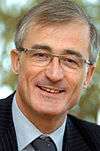
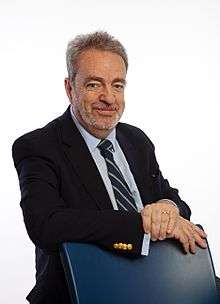
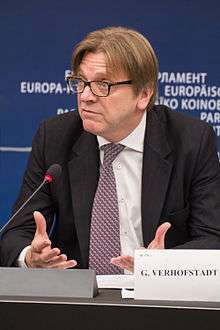
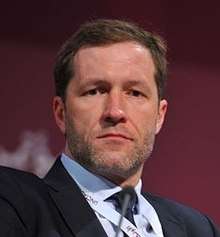
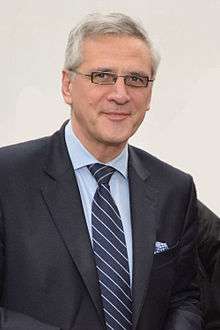
_(cropped).jpg)
.jpg)

